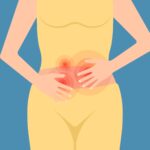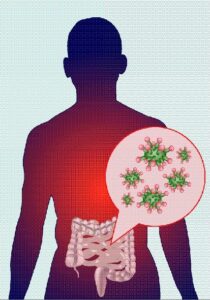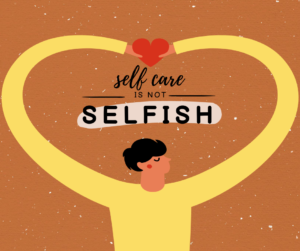Hello all!
I'm so excited and proud to be launching my new website ndraina.com. This has been made possible through the efforts of Abeona Web Services
Read More
Blog
Do you have food sensitivities?

As a naturopathic doctor I work with a lot of people that have digestive concerns. They might be experiencing bloating, excessive gas, heartburn, strange stomach noises, constipation or diarrhea however digestion should be a silent process. When digestion is normal you should be able to eat a wide variety of healthy whole foods and have one or two full, complete and easy to pass bowel movements in a day and basically that’s it. Yet many people experience persistent and bothersome digestive symptoms that decrease quality of life and the first thing they tend to blame is the foods that are being eaten. Now, if there is excessive intake of sugary and/or processed foods then yes this should be eliminated but when it comes to the vast majority of healthy whole foods we should be able to digest them without any issues. And as a naturopathic doctor one thing I don’t what to do is ask my patients to eliminate what is otherwise a healthy food unless there is strong evidence to suggest it because I don’t want my patients to be stuck with an ever shortening list of whole and healthy foods that they think they need to avoid. So how do I help address their digestive concerns? Well there’s more than just the foods we eat that affect digestive function. In fact our digestive tract had more nerve endings than our brain so stress can have a significant impact on its function, additionally there’s the chemicals of digestion; acid, bile and enzymes and if they’re deficient then digestion will be greatly affected. Furthermore the immense microbiome that resides along the digestive tract has a major influence on digestive function. The microbiome can be easily disrupted which leads to leaky gut and inflammation. When I work with patients that have digestive concerns I take the time to do a full assessment of all the factors that impact digestive function and then help to make sure that the digestive tract is functioning at its full capability before starting to think that it’s the foods that are the problem. So if you’re seeing your list of healthy whole foods teat shrinking while your digestive concerns persist then its time to have a full naturopathic assessment and work up of your digestive system to detect and address the underlying reason for this issue.
How to Get Enough Sleep for a Healthy Lifestyle

Sleep is one of the four pillars of lifestyle health and this makes sense because having adequate restful sleep can have profound effects on our well being. And by having inadequate sleep that is not restful makes it so hard for our body to function normally. When we don’t get enough sleep, simple tasks become challenging, we can easily become stressed and it is even harder to regulate our emotions. Moreover, the cumulative effects of sleep loss and sleep disorders have been associated with a wide range of health consequences such as an increased risk of high blood pressure, diabetes, obesity, depression, heart attack, and stroke. Fortunately there’s lots we can do to help ourselves get a good night’s sleep. Here are seven simple strategies to help promote adequate and restful sleep
- Get Daylight Exposure: Light, especially sunlight, is one of the key drivers of circadian rhythms that can encourage quality sleep.
- Be Physically Active: Regular exercise can make it easier to sleep at night and also delivers a host of other health benefits.
- Reduce Alcohol Consumption: Alcohol may make it easier to fall asleep, but the effect wears off, disrupting sleep later in the night. So it’s best to moderate alcohol consumption and avoid it later in the evening.
- Budget 30 Minutes to Wind Down: Take advantage of whatever puts you in a state of calm such as soft music, a warm shower and light stretching. Light smells, such as lavender help to calm the mind and induce sleep
- Dim Your Lights: bright lights hinder the production of melatonin, a hormone that the body creates to facilitate sleep.
- Unplug From Electronics: Cell phones, tablets, and laptops cause mental stimulation that’s hard to shut off and also generate blue light that decreases melatonin production.
- Set a Cool Yet Comfortable Temperature: set your bedroom temperature to suit your preferences, but err on the cooler side around 19-20 degrees
Does it Make Sense to Eliminate Carbs?

As a naturopathic doctor I hear a lot of people saying that carbs are bad or should be eliminated. But that’s a bit of an oversimplification because in the carb family there is the good and not so good. First off, carbohydrates are just one of the three macronutrients that we have and the others are proteins and fats. By giving up carbs it means we’d be giving up on a lot of healthy food options such as fruits, vegetables, grains, lentils and legumes. It’s important to remember that not all carbs are the same; there are the complex carbs (lentils/legumes, steel cut oatmeal, non starchy vegetables (broccoli, cabbage, spinach, zucchini, peppers, celery, cucumber) which are nutrient dense and calorie light and then there are the simple carbs (sugary foods/drinks, bread, rice, pasta, cereal, potatoes) which are high in calories and offer few nutrients. If we are to “elminate carbs” definitely it’s better to put that focus on simple carbs while still maintaining adequate intake of complex carbs. So being told to eliminate carbs is like being told to sit on a stool with only two legs – it’s not a very good idea because you won’t be able to keep balanced!
Springtime Detox!

Spring is a time for rebirth and renewal which makes it the best time of year to do a detox and with about 2 weeks of spring time remaining there’s still just enough time to do a good detox for the mind and body.
Doing a detox is a great way to give the body a break from all the synthetic chemicals we are constantly exposed to. And whether it’s vehicle emissions, plastic off gassing, or the chemicals that are commonly found in cosmetics, cleaning products and even certain foods it’s important to enhance the body’s ability to clear these unwanted toxins. But first before doing a detox it’s important to consult with your naturopathic doctors and make sure that the organs of detox; the skin, kidneys, liver and bowels are all healthy enough to take on this type of deep clean.
A detox doesn’t have to last long but it should be comprehensive and start from the foundations up. First it’s important to reduce chemical exposures so it would be a good time to change the air filter in your furnace and car, reduce plastic exposures, and stick to organic foods while avoiding processed foods, sugars, caffeine and animal fats. Next it’s important to nourish the body with clean and healthy foods and drinks by eating a diet that’s based on fruits, vegetables, lentils, legumes and nuts and seeds with occasional servings of dairy grain and lean meats. All the while staying hydrated with plenty of water, lemon water and even herbal teas such as nettle or burdock. A detox works best when we keep the body moving with some gentle exercises like walking, biking and stretching since this helps us to sweat and promotes circulation of the blood and lymph. But since the body is working hard to detox and eliminate toxins it’s important to not push this too hard and actually it’s a good idea to take some rest with massage, contrast showers, deep breathing and plenty of sleep.
When the foundations of detox: avoid toxins, nourish the body, exercise and rest are in place then adding in the detox supplements are most effective. And of course choosing the right supplements for the individual situation is best done by a naturopathic doctor because nutritional supplements and herbal remedies when expertly selected can enhance the detox and make us feel great or it can do the opposite and overload the body with a healing crisis. So even though a detox is a useful and important reset for the body and a great part of healthy living it should be done correctly with the guidance of a naturopathic doctor.
The Importance of Being Outdoors

Promoting the healing power of nature is a principle of Naturopathic medicine that is important to put into practice as a Naturopathic Doctor. And now research into this very concept is showing that spending time in green space or bringing nature into your everyday life can benefit both your mental and physical wellbeing. For example, doing things like growing food or flowers, exercising outdoors or being around animals can have lots of positive effects. It can:
– improve your mood / reduce feelings of stress or anger
– improve your physical health/ help you be more active
– improve your confidence and self-esteem / reduce loneliness We all have different experiences of nature, and different reasons for wanting to connect with it more. You might find you get something completely different from one activity compared to someone else.
Spending time in nature has been found to help with mental health problems such as anxiety and depression. For example, research into ecotherapy (a type of formal treatment which involves doing activities outside in nature) has shown it can help with mild to moderate depression. This might be due to combining regular physical activity and social contact with being outside in nature. A 2010 study on green exercise showed nature’s healing properties can be further enhanced when combined with movement, which releases endorphins—stress-releasing hormones—in the brain. In just five minutes of green exercise, study participants reported improvements in self-esteem and mood, regardless of their health status, gender, or age.
We each have unique ways of experiencing and appreciating nature, and the rewards we reap can vary widely. However, the common thread is clear: time spent in nature is time well spent. From reducing stress and improving mood to fostering physical health and building self-esteem, the healing power of the outdoors is a resource we should all make an effort to tap into. So, take a moment to step outside, breathe in the fresh air, and let nature work its magic on your mind and body.
Food Choices...

Making healthy food choices can be a very complicated part of daily living. There is an ever increasing array of food choices on the market, the constant emergence of new fads with foods and the onslaught of advertisement to compel us to buy one food product over another. How is one to cope? As a naturopathic doctor that helps people to make healthy eating a sustainable and practical practice I like to simplify things when it comes to food choices. In my view there are basically two types of foods to choose from; packaged/processed foods and whole foods. Packaged/processed foods are concocted in lab by food scientists so that they’re engineered to be as tasty and crave-able as possible while still being cheap to produce, then the come off the conveyor belt in mass quantities and placed into appealing packages so that they allure the shopper to buy them. These foods are usually found in the aisles of the grocery store and typically taste great thereby satisfying the tongue with instant gratification while leaving the other organs of the body in a relative state of disarray and downstream health implications. And of course these foods also satisfy the shareholders since they’re primarily made to generate profits for the corporations that produce them. Whereas whole foods are foods that have been growing in and on this earth for hundreds of years. These foods are found in the perimeter of the grocery store and they not only taste great as well but they also have a synergistic relationship with the human body and mind by promoting good health and longevity. So the next time you go to the grocery store take inventory of where you’re buying your food from. Is it from the aisles or is it from the perimeter? . As a naturopathic doctor, I’m here to help you make informed, sustainable food choices that benefit your overall well-being. Contact me to schedule a consultation and learn how to navigate the grocery store with confidence, focusing on whole foods that promote long-term health. Let’s simplify your approach to nutrition together.
From My Bookshelf

I had the recent utmost pleasure of reading The Myth of Normal by Dr. Gabor Mate. “The Myth of Normal” is a profound exploration into the emotional underpinnings of poor health, offering a transformative perspective that challenges conventional wisdom. As someone who has delved into its pages, I can’t help but appreciate the depth of insight it provides. This book not only exposes the fallacy of societal definitions of “normalcy” but also invites readers on a journey to understand the complex interplay between emotions and well-being. Through captivating narratives and compelling research, it unveils the hidden connections between our emotional experiences and the state of our health, shedding light on how our inner worlds shape our physical realities. For anyone seeking a deeper understanding of the emotional roots of poor health and yearning for transformative insights, “The Myth of Normal” is an essential read. It challenges us to question preconceived notions, encourages self-reflection, and ultimately empowers us to embark on a journey toward holistic well-being.
Foods That Heal.

As a naturopathic doctor that sees patients in-person and online I spend a great deal of time assisting them with alleviating digestive symptoms. Digestive symptoms can have major impacts on how one feels day to day and it’s a big influence on the overall quality of life. It’s challenging to live the life you want if you’re constantly worried if your next meal will cause an array of unpleasant symptoms or if every time you go out you need to know where your nearest bathroom is – just in case there’s a sudden call of nature! And bowel movements are a foundation of health because when bowels are off it can impact so many different aspects of health such as our energy levels, hormones, cholesterol, skin health, headaches and other bodily pains or inflammation.
When treating patients with various digestive concerns I have several tools in my naturopathic toolbelt to assist. Ranging from nutritional supplements to botanical medicine and of course probiotics I will select the appropriate form, dose and duration of natural health products to alleviate symptoms and/or address the root cause of the concern. Fortunately natural health products are tightly regulated by Health Canada and over the past ten to fifteen years more and more healthcare research is establishing the appropriate use of such products in the treatment of various conditions. But even though natural health products can be a relatively safe complement and sometimes even alternative to pharmaceutical medicine, an even more important and “safe” way to treat digestive ailments is through food.
Of course eating a balanced, whole foods diet is the backbone of naturopathic care and long term good health but there are also specific foods that can have a very useful role in helping the body to heal from many digestive conditions. Foods like garlic, ginger, psyllium fiber, apple cider vinegar, ground flax seed, aloe vera juice and even certain herbal teas are all grocery store purchases that act as potently as other well known medicines when appropriately recommended by a naturopathic doctor like myself. My preference is to heal through food; not just with healthy eating but with foods that can directly alleviate symptoms and address the root cause of illness.
So if you’re ready to take charge of your digestive health and reclaim your quality of life, schedule an appointment with me, a naturopathic doctor that works in digestive health. Whether you’re dealing with chronic discomfort, unpredictable bowel movements, or simply want to optimize your gut health, I can help. From personalized nutritional guidance to targeted natural remedies, to testing that uncovers the underlying issues; let’s work together to find lasting solutions that prioritize your well-being. Don’t let digestive issues hold you back any longer—book your appointment today and take the first step towards the health you deserve.
Test - Don't Guess!

Naturopathic doctors can order a wide variety of tests ranging from conventional blood work that is often run by medical doctors to more involved testing of the blood, saliva, stool or urine. When it comes to ordering conventional blood work I will often suggest that this is initially requested of the patient’s medical doctor since it’s covered by OHIP but if we’re not able to get the full scope of conventional blood work then I can make that order. Where I more commonly order lab tests is from what is sometimes referred to as Naturopathic testing and this can include inflammatory marker testing, hormone testing, food sensitivity testing, and microbiome testing. But of all the tests that I have run, the microbiome test leads the way as the test that I have ordered most often and as the test that has proved the most useful for my patients.
The microbiome refers to the community of synergistic bacteria that reside in and on our body but exists in greatest abundance in our gut. And these good bacteria exert a lot of important benefits for our health including assisting with digestion, controlling inflammation and regulating immune function. However the microbiome is a complex thing that is subject to a lot of influences based on what we eat, our stress, the health of our immune system and even medications use. Certain medications such as the birth control pill, steroid medications, antibiotics and prescribed antacids can cause major deviations to the health of the microbiome which then has downstream effects on overall health. Though it might be easy for a Naturopathic Doctor like myself to figure out that the microbiome has been adversely impacted it’s not all easy to know exactly how it’s been affected because the devil is in the details.
Without knowing what good bugs are missing, what bad bugs are present and what natural substance can effectively eradicate the symptom causing bugs patients often get stuck in a seemingly endless cycle of ineffective treatments and a lack of symptom improvement. So that is why it’s important to test and not guess! Using a microbiome stool test that has a very high level of sensitivity and specificity the actual makeup of the microbiome can be identified and what’s more is that the test can also indicate what treatments are most effective to deal with the identified problems. Coupled with a detailed, holistic intake I often use a gut microbiome testing to identify the specific issues that contribute to your health status. With this invaluable information in hand, I tailor a precise treatment plan designed to address your individual health needs and support your body’s natural healing processes.
Book a virtual consultation so we can delve deep into understanding your unique microbiome. Don’t rely on guesswork; let’s use the power of precise testing to uncover what’s actually happening inside your body. Together, we’ll create a tailored treatment plan that supports your body’s natural healing processes and puts you on the path to vibrant health.
Buying Organic Just Got Easier!

Buying healthy organic produce from the grocery store is not exactly a low cost endeavor but fortunately there’s a great grocery shopping hack that can really save you some money while being smart about food choices. As a doctor of Naturopathic Medicine we place a large emphasis on diet and nutrition as the backbone of good long term health and it’s because the old adage is actually true: we literally are what we eat! Our skin regenerates itself entirely every two months, our blood supply is completely replaced every three months and our liver can regenerate in a matter of weeks!! And where do you think all the building blocks for these bodily home renovations come from? It all comes from what we eat and drink.
So what we choose to put into our bodies matters a lot because by eating healthy balanced nutritious foods we can actually dictate the composition of our body, mind and our overall health. But it’s not exactly easy and straightforward to make healthy food choices when we go to the grocery store, especially in the world of corporate agriculture where whole foods are sprayed by various chemicals such as pesticides, herbicides and preservatives. The trouble is that despite the fact the foods themselves are healthy the chemicals they’re being exposed to are known to have negative effects on health and the cumulative exposure to them can be overwhelming to the digestive tract and the body’s ability to detox them. So one very useful option here is to buy organically grown, non-GMO and glyphosate free foods whenever possible since this is a way to side step the health threats that ongoing exposures to pesticides, herbicides and preservatives pose.
But I know what you’re going to say – that’s super expensive and food costs are already getting higher and higher every day. Of course I appreciate this as a legitimate concern and so let me introduce the Environmental Working Group (EWG) list of the clean 15 and the dirty dozen. This is an annually produced list of the “cleanest” and “dirtiest” non-organic produced food as determined by a thorough analysis of the latest fruit and vegetable testing data from the Department of Agriculture and Food and Drug Administration. The 2024 guide includes data from 47,510 samples of 46 fruits and vegetables. So the dirty dozen are the 12 fruits and vegetables that were found to be the most contaminated with pesticides and the clean fifteen had the lowest amounts of pesticide residues, according to EWG’s analysis. Using these lists the savvy and health conscious grocery shopper can direct their purchases to buy organic if buying a so-called “dirty” food and feel okay about buying non organic when buying a “clean” food.
Clean 15 (don’t worry about buying these organic since they’re fairly ‘clean’)
Avocados
Sweet corn
Pineapple
Onions
Papaya
Sweet peas (frozen)
Asparagus
Honeydew melon
Kiwi
Cabbage
Watermelon
Mushrooms
Mangoes
Sweet potatoes
Carrots
Dirty dozen (do your best to buy these organic whenever possible)
Strawberries
Spinach
Kale, collard, and mustard greens
Grapes
Peaches
Pears
Nectarines
Apples
Bell & Hot Peppers
Cherries
Blueberries
Green Beans
Now that you’re equipped with valuable information about making healthier food choices, take the next step towards optimizing your overall health. Schedule an appointment with Dr. Romi Raina ND today. Working with a naturopathic doctor you’ll be able to create a personalized plan that aligns with your dietary goals, ensuring you make the best choices for your well-being. Don’t wait any longer to invest in your health – book your naturopathic appointment now and embark on a journey towards a healthier, happier you!
Spiced Moroccan Lentil Soup

Ingredients:
- 1 cup red lentils, rinsed and drained
- 1 onion, chopped
- 2 cloves garlic, minced
- 1 carrot, diced
- 1 sweet potato, peeled and diced
- 1 red bell pepper, diced
- 1 can (14 oz) diced tomatoes
- 4 cups vegetable broth
- 2 teaspoons ground cumin
- 1 teaspoon ground coriander
- 1/2 teaspoon ground turmeric
- 1/2 teaspoon paprika
- 1/4 teaspoon ground cinnamon
- Salt and pepper to taste
- 2 tablespoons olive oil
- Juice of 1 lemon
- Fresh cilantro or parsley for garnish (optional)
Instructions:
Heat the olive oil in a large pot over medium heat. Add the chopped onion, garlic, and spices (cumin, coriander, turmeric, paprika, and cinnamon). Sauté for a few minutes until the onions become translucent and the spices are fragrant.
Add the diced carrot, sweet potato, and red bell pepper to the pot. Cook for another 5 minutes, stirring occasionally.
Pour in the vegetable broth, diced tomatoes (with their juices), and rinsed red lentils. Bring the mixture to a boil, then reduce the heat to a simmer. Cover the pot and let it simmer for about 20-25 minutes or until the lentils and vegetables are tender.
Use an immersion blender to carefully puree the soup to your desired consistency. If you don’t have an immersion blender, you can transfer portions of the soup to a blender, but be cautious as it will be hot.
Season the soup with salt and pepper to taste. Squeeze in the juice of one lemon and stir to combine.
Serve the Moroccan Lentil Soup hot, garnished with fresh cilantro or parsley if desired. You can also add a dollop of yogurt or a drizzle of olive oil for extra richness.
The Daily Detox

So you can’t face a total detox or your lifestyle makes it just impossible? Don’t give up! There are plenty of simple, everyday things you can do to minimize your toxic exposure and even to let go of many of the toxins you have already accumulated.
Try incorporating as many of these guidelines into your life as you can. The more you do, the better you will feel – but adopting even one or two of these habits will make a large difference.
- Drink plenty of water throughout the day. Try keeping a bottle of fresh spring or mineral water on your desk and pause for regular sips.
- Make fresh juices part of your life. Invest in a good-quality juicer and enjoy nourishing energy-packed fresh fruit and vegetable juices whenever you can.
- Cut down on your alcohol intake. Drink two glasses of water for every alcoholic beverage. Try diluting your drinks (i.e., enjoy spritzers instead of straight wine; small spirit measures plus a liberal dose of fresh juice instead of strong drinks).
- Cut out “junk” and processed foods. They’re one of the quickest routes to toxic (and fat) overload, and they are surprisingly expensive! If you’re short on time, go for a better brand of “fast food”: a healthy sandwich, some eggs, fruit or a salad.
- Cut down on your caffeine intake. Try cutting out just one cup of coffee a day and replacing it with herbal tea, hot lemon and water (deeply detoxifying) or a natural coffee substitute instead. Gradually replace another cup, and then another. The same goes for caffeinated sodas.
- Introduce regular exercise into your life. Learn the yogic Sun Salutation and make it part of your morning routine. Take an after-dinner walk with your partner. Keep a jumprope in your desk drawer. Try a new sport. Just get moving on a regular basis.
- Practice good, deep breathing. Even if it’s just for five minutes a day, take time out to focus on your breath, allowing your abdomen to press out as you breathe in, and flatten as you breathe out. Spend a few moments before you get out of bed just focusing on your breath.
- Switch to nontoxic natural alternatives for cleaning materials around the home. If you dry-clean your clothes, take them out of the wrapping and leave them outside in the fresh air for at least an hour before bringing them into your closet.
- Eat lots of fresh fruit and vegetables. Make fresh soups, salads, spring stews and stir-fries. Fruit and vegetable juices, especially beetroot, broccoli and celery, are ideal for detoxing, so try to juice your own whenever possible. Choose organic produce if you can (to cut out pesticides and other chemicals). Use only a limited amount of sea salt in your flavoring; natural herbs and spices are fine, but avoid commercial seasoning mixes, which may contain sodium and other flavor additives.
- Have two or three servings of protein a day of deep-water fish, organic eggs and chicken, soy products and legumes. Grill or poach fish or chicken, or incorporate any of the above in salads and stews. Nutritional therapist Linda Lazarides, author of The Amino Acid Report suggests you incorporate some Brazil nuts and sunflower seeds, all of which contain vital detox amino acids (and which make great snacks). Avoid peanuts unless you are certain you have no sensitivities to them.
What Is Dysbiosis?

A major clinical focus for me is identifying and treating
dysbiosis but many people don’t know what it is or the many negative effects it
can have on our health. Dysbiosis occurs when the balance of bacteria gets
disrupted & the emergence of non beneficial or harmful microbes take the
place of the good bacteria. And there are many negative downstream
consequences from loosing or beneficial gut bacteria.
As it happens the gut
interacts with the good bacteria anytime anything wants to enter from the
digestive tract into the bloodstream and since we can just allow anything into
the bloodstream our immune system has a lot to say here. In fact, it’s
this interaction of foods stuff from the digestive tract, our immune system and
the good bacteria that helps the body identify what’s good for us and should be
absorbed in and what’s bad for us and should be eliminated out. So, if
this process gets disturbed it can result in ineffective nutrition, a confused
immune response and the emergence of chronic inflammation. Dysbiosis has been reproducible observed in people with inflammatory
bowel disease, psoriatic arthritis, atopic eczema, obesity, celiac disease type
II diabetes, arteriosclerosis.
Dysbiosis is
treatable and the negative outcomes of dysbiosis can be avoided. After
being diagnoses with dysbiosis it’s important to have stool testing performed
so that specific microbial strains can be identified, and the correct medicines
can be selected. I have had many years of experience in helping patients
effectively treat this condition.
Sedentary, Stress & Sugar!!

The immune system is the body’s natural defense mechanism against harmful pathogens, infections and inflammation. However, certain lifestyle factors such as stress, high sugar intake, and sedentary behavior can suppress the immune system, leaving the body vulnerable to infection, disease and uncontrolled inflammation.
Stress triggers the release of hormones such as cortisol and adrenaline, which can inhibit the immune system’s ability to fight off infections. High blood cortisol can cause use to crave sugar and lead to more belly fat too. Also, chronic stress can lead to long-term suppression of the immune
system leading to increased inflammation and increase the risk of infections.
High sugar intake can also weaken the immune system. When consumed in excess, sugar can interfere with the functioning of white blood cells, which are responsible for fighting infections. This can lead to an increased risk of infections and a longer recovery time. Consuming too much sugar is a double whammy. It feeds any bacteria that are trying to take up residence and cause infection AND it suppresses our white blood cell activity. Without a doubt sugar is the number 1 dietary immune suppressant!
Sedentary behavior can also suppress the immune system. Lack of physical activity can lead to a decrease in the number of immune cells in the body, making it easier for infections to take hold. Physical inactivity is associated with chronic low-grade inflammation, and a sluggish immune response
It’s essential to adopt healthy lifestyle habits to support a robust immune system. Managing stress levels, reducing sugar intake, and engaging in regular physical activity can help keep the immune system functioning optimally and protect the body from infections and diseases.

Self Care is not Selfish
Self-care is the act of taking deliberate steps to improve one’s physical, emotional, and mental health. In today’s fast-paced world, it can be easy to overlook the importance of taking care of oneself. However, prioritizing self-care is crucial for maintaining overall good health.
One key aspect of self-care is getting enough sleep. When we are well-rested, we are better able to handle the stresses of daily life, and our immune system is better equipped to fight off illness. Inadequate sleep has been linked to a wide range of health problems, including obesity, diabetes, and heart disease.
Nutrition is another important component of self-care. Eating a balanced diet rich in fruits, vegetables, whole grains, and lean protein can help to maintain a healthy weight, boost immunity, and reduce the risk of chronic diseases such as heart disease and cancer.
Physical activity is also vital for good health. Regular exercise can help to reduce the risk of chronic diseases, such as obesity, diabetes, and heart disease. It can also boost mental health by reducing symptoms of anxiety and depression.
Stress management is another important aspect of self-care. Chronic stress has been linked to a wide range of health problems, including high blood pressure, heart disease, and mental health disorders such as anxiety and depression. Taking time to engage in relaxation techniques, such as meditation or deep breathing, can help to reduce stress levels and improve overall health.
In conclusion, self-care is a critical component of maintaining good health. Prioritizing sleep, nutrition, physical activity, and stress management can confer important benefits to human health, including a reduced risk of chronic disease, improved mental health, and an overall sense of well-being. Taking the time to care for oneself is a worthwhile investment in long-term health and happiness.
